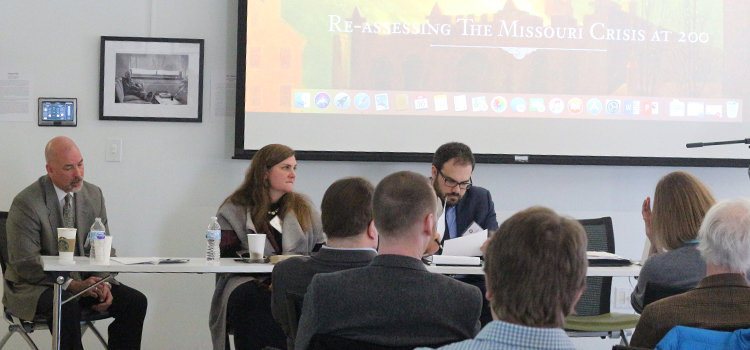Graduate Programs
Ph.D. and M.A. Fellowships

The Kinder Institute seeks to establish a thriving community of graduate researchers in the fields of history and political science whose work transcends disciplinary boundaries in advancing the study of political thought, history, and institutions. All Kinder Institute Graduate Fellows are housed in the Institute’s central offices high atop historic Jesse Hall, a peerless collaborative workspace on campus that provides students with easy access to our faculty and postdoctoral fellows and is also the venue for our vibrant colloquium and academic workshop series.
In addition to the fully-funded studentships detailed below, Fellows are eligible to apply for dedicated graduate student research and travel grants from the Kinder Institute and are encouraged to pursue some of the many opportunities in research, publishing, and public history that the Institute and neighboring institutions support. For instance, multiple Fellows have held or currently hold research positions with the Missouri Humanities Council and at the State Historical Society of Missouri, a major archive located across the street from the Institute. Beginning in Fall 2019, we also began sponsoring a more programming-oriented Collegiate Fellowship position in the Kinder Institute Residential College for interested M.A. and Ph.D. candidates. The Institute also frequently hosts lectures, conferences, and other events that offer graduate students unrivaled opportunities for professional and intellectual development.
Faculty members at the Kinder Institute have a proven track record of placing PhDs in tenure-track posts. In recent years, they have supervised students who have secured permanent positions in history or political science at the University of Oxford, Ohio State University, University College London, Washington State University, Oklahoma State University, Arizona State University, Baylor University, Providence College, Sewanee, and the University of Texas at Dallas.
Eligibility
Our graduate fellowships are designed for incoming and current University of Missouri graduate students who are interested in working with Kinder Institute faculty and are deeply engaged in the study of topics related to the Institute’s scholarly focus: constitutionalism and its history; American political thought and its antecedents and influences; American political history, broadly understood in its global, social, cultural, and economic contexts, especially during the formative 18th and 19th centuries; and the founding and continued development of American political institutions.
Students who would like to pursue a graduate fellowship at the Kinder Institute should apply for admission through the regular channels in the MU Departments of History and Political Science. Application materials should indicate an interest in working with the Kinder Institute and specific faculty members there, as well as include a note on how a candidate’s anticipated plan of graduate study aligns with the broad scholarly mission of the Institute.
Instructions on applying for graduate study in the MU Departments of History and Political Science, including important deadlines, can be found in the links below.
- MU Department of History Application Guidelines
- MU Department of Political Science Application Guidelines
Questions regarding graduate fellowships in History can be directed to Kinder Institute Chair in Early American History Jeffrey L. Pasley, PasleyJ@missouri.edu, or Kinder Institute Director Jay Sexton, SextonJ@missouri.edu. For questions about fellowships in Political Science, please contact Kinder Institute Professor of Constitutional Democracy and Professor of Political Science Jay Dow, dow@missouri.edu.
Kinder Institute Fellowships
The four fellowships detailed below provide students with computer-equipped office space in the Kinder Institute headquarters in Jesse Hall, and require residence in the Columbia area throughout the academic year and participation in Kinder Institute activities. Additional opportunities will become available to students who demonstrate exceptional engagement in the intellectual life of the Institute.
Kinder Graduate Fellowship in Political Science
For incoming students seeking a Ph.D., this fellowship comes with a renewable, yearly stipend plus teaching assistant salary from the Department of Political Science, the latter of which requires a five-year commitment and the fulfillment of usual instructor and/or T.A. duties.
Kinder M.A. Fellowship in History
For incoming students without a Master’s Degree, these fellowships come with a competitive yearly stipend and require a two-year commitment. There are no teaching responsibilities associated with the position, and M.A. Fellows must re-apply for Kinder Ph.D. Fellowships upon fulfillment of the Master’s degree requirements.
Kinder Ph.D. Fellowship in History
For incoming students with a Master’s or equivalent degree, these fellowships come with a competitive stipend and require a five-year commitment. There are no teaching requirements in the first two years of the fellowship, but Ph.D. Fellows will become eligible for T.A. positions in years three and four after comprehensive exams are passed and a dissertation prospectus has been approved.
Kinder Dissertation Fellowships
Finances permitting, the Kinder Institute also awards Dissertation Fellowships to two current Ph.D. candidates per year, one each in the MU Departments of History and Political Science. These fellowships come with a competitive stipend and release recipients from teaching responsibilities, allowing them to devote exclusive attention either to writing their prospectuses, launching dissertation projects, or completing and defending their dissertations. These fellowships require dissertation topics germane to the Kinder Institute’s scholarly mission; demonstrated prior engagement in Kinder Institute activities; and at least one external letter of recommendation.
Haskell Monroe Fellowship
The Kinder Institute on Constitutional Democracy, the History Department at the University of Missouri, and the University Libraries collaboratively support the Haskell Monroe Graduate Fellowship in Civil War-era history. Dr. Monroe was a former Chancellor of the University of Missouri and a scholar of the American South during the age of the Civil War. The fellowship is open to grad student applicants at both the M.A. and the Ph.D. level whose proposed research focuses on the era of the American Civil War. In addition to their graduate coursework and research, the holder of the fellowship will pursue a digital humanities project that will summarize, classify, and publish Dr. Monroe’s extensive bibliography of first-hand accounts of life in the Confederate States from 1861 to 1865.
Questions about the Haskell Monroe Fellowship can be directed to Kinder Institute Director and Professor of History Jay Sexton (sextonj@missouri.edu).
